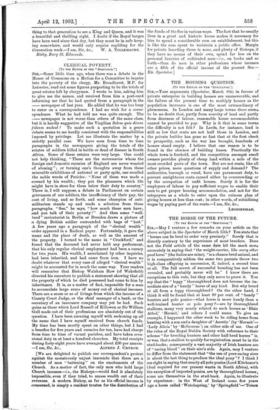CLERICAL POVERTY.
[TO TEE EDITOR OF THE " SPECTATOR."] 'Sin.,—Some little time ago, when there was a debate in the House of Commons, on a Motion for a Committee to inquire into the poverty of the clergy, Mr. Broadhurst, M.P. for Leicester, read out some figures purporting to be the totals of great estates left by clergymen. I wrote to him, asking him to give me the names, and received from him a post-card informing me that he had quoted from a paragraph in the — newspaper of last year. He added that he was too busy to enter on a correspondence. I had no wish for a corre- spondence. What he had told me was quite enough. The --- newspaper is not worse than others of the same class, but it is hardly suggestive of the Virgilian Solent quis dicere falsum aucleat ? To make such a quotation in a grave debate seems to me hardly consistent with the responsibilities imposed by privilege. Let me illustrate the matter by a strictly parallel case. We have seen from time to time paragraphs in the newspapers giving the totals of the estates of soldiers killed in battle or dead of disease in South Africa. Some of these estates were very large. One could not help thinking, " These are the mercenaries whom the foreign and domestic enemies of England are never wearied of abusing " ; or turning one's thoughts away from these miserable exhibitions of national or party spite, one recalled the noble words of Pericles : " None of them was made a coward by his wealth ; they put the pleasures which life might have in store for them below their duty to country." There is, I will suppose, a debate in Parliament on certain grievances of our soldiers, the insufficiency of their pay, the cost of living, and so forth, and some champion of anti- militarism stands up and reads a selection from these paragraphs. " See," he says, " how much these men have ; and you talk of their poverty !" And then some " well- bred" caricaturist in Berlin or Dresden draws a picture of a dying British soldier surrounded with bags of " loot." A few years ago a paragraph of the "clerical wealth" order appeared in a Radical paper. Fortunately, it gave the name and the place of death, as well as the amount of the property. I turned to the name in " Crockford," and found that the deceased had never held any preferment, that his only regular clerical employment had been a curacy for two years. His wealth, I ascertained by other inquiries, lad been inherited, and had come from iron. I have no doubt whatever that every case of alleged "clerical wealth" might be accounted for in much the same way. Your readers will remember that Bishop Walsham How (of Wakefield) directed his executors to publish a statement showing that all the property of which he died possessed had come to him by inheritance. It is, as a matter of fact, impossible for a man to accumulate large sums of money out of clerical incomes. There are a score or so of livings from which the income of a County Court Judge, or the chief manager of a bank, or the secretary of an insurance company may yet be bad. Such gains as those which Lord Russell of Killowen or Sir William Gull made out of their professions are absolutely out of the question. I have been amusing myself with reckoning up all the sums that I have myself received from church funds. My time has been mostly spent on other things, but I had a benefice for five years and curacies for ten, have had charge from time to time of vacant parishes, and have taken occa- sional duty in at least a hundred churches. My total receipts during forty-eight years have averaged about £30 per annum.
[We are delighted to publish our correspondent's protest against the monstrously unjust innuendo that there are a number of men " battening" on the emoluments of the Church. As a matter of fact, the only men who hold large Church incomes—i.e., the Bishops—would find it absolutely impossible, even if they tried, to amass wealth out of their revenues. A modern Bishop, as far as his official income is concerned, is simply a resident trustee. for the distribution of the funds of the See in various ways. The fact that he usually lives in a great and historic house makes it necessary for him to spend a considerable sum on establishment, but this is like the sum spent to maintain a public office. Margin for private hoarding there is none, and plenty of Bishops, if they have no means of their own, spent far less on the personal luxuries of cultivated men—i.e., on books and so forth—than do men in other professions whose incomes are a fifth of the official income of the poorest See.— ED. Spectator.]










































 Previous page
Previous page